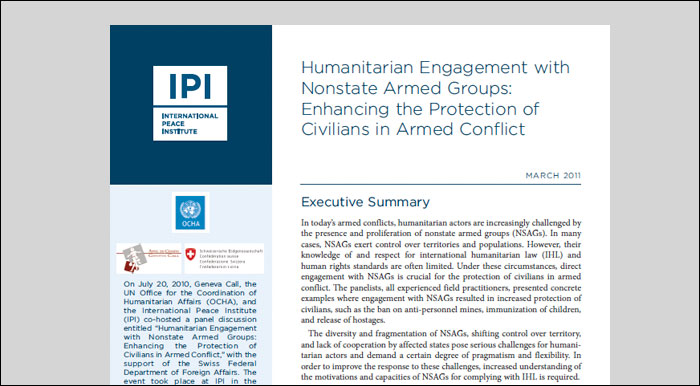 This meeting note captures the panel discussion that took place on July 20, 2010 entitled “Humanitarian Engagement with Nonstate Armed Groups: Enhancing the Protection of Civilians in Armed Conflict.”
This meeting note captures the panel discussion that took place on July 20, 2010 entitled “Humanitarian Engagement with Nonstate Armed Groups: Enhancing the Protection of Civilians in Armed Conflict.”
The discussion took place at IPI in the aftermath of the UN Security Council’s July 7, 2010, open debate on the protection of civilians. It brought together more than ninety representatives of member states, the UN Secretariat, and nongovernmental organizations to discuss the value of and best practices for engaging with nonstate armed groups to move them toward compliance with international humanitarian law.
Geneva Call, the UN Office for the Coordination of Humanitarian Affairs (OCHA), and the International Peace Institute (IPI) co-hosted the event with the support of the Swiss Federal Department of Foreign Affairs.
From the Executive Summary:
In today’s armed conflicts, humanitarian actors are increasingly challenged by the presence and proliferation of nonstate armed groups (NSAGs). In many cases, NSAGs exert control over territories and populations. However, their knowledge of and respect for international humanitarian law (IHL) and human rights standards are often limited. Under these circumstances, direct engagement with NSAGs is crucial for the protection of civilians in armed conflict.
The panelists, all experienced field practitioners, presented concrete examples where engagement with NSAGs resulted in increased protection of civilians, such as the ban on anti-personnel mines, immunization of children, and release of hostages.
The diversity and fragmentation of NSAGs, shifting control over territory, and lack of cooperation by affected states pose serious challenges for humanitarian actors and demand a certain degree of pragmatism and flexibility.
In order to improve the response to these challenges, increased understanding of the motivations and capacities of NSAGs for complying with IHL is required. A neutral and purely humanitarian agenda is also key to building successful relationships with all parties. The panelists further emphasized the importance of involving local civil-society actors in the engagement process and making strategic use of the comparative advantages of UN agencies and NGOs. Panelists urged member states to support, or at least not to obstruct, efforts by humanitarian actors to engage NSAGs, in order to seek improved protection for civilians, and they stressed that such efforts do not affect the legal or political status of NSAGs.







